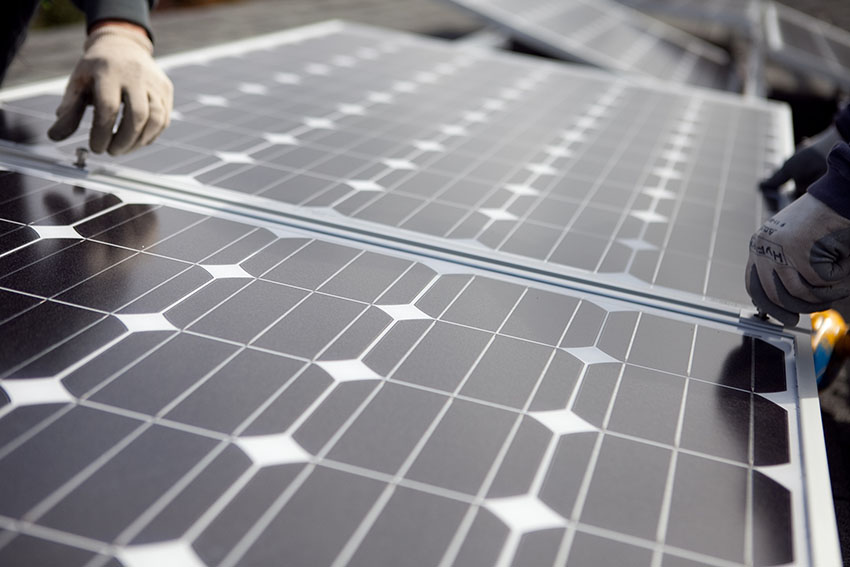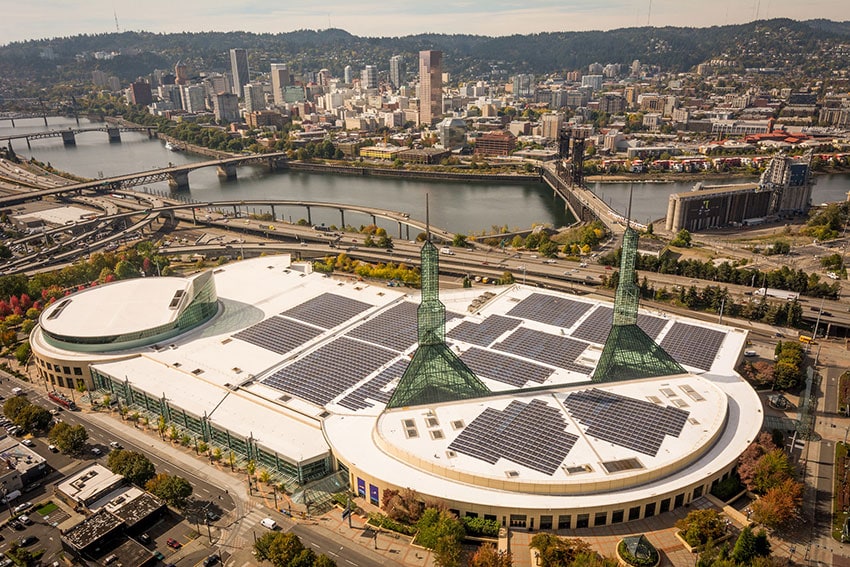Generating your own solar energy saves on operating costs and reduces your carbon footprint. Adding battery storage allows your solar system to do even more by providing backup power to keep essential equipment operating during outages.
Energy Trust makes it easy to add solar or solar + storage with solar development assistance, battery storage development assistance, cash incentives and referrals to qualified contractors. Energy Trust incentives, federal tax credits and accelerated depreciation could offset up to 50% of system costs. Also learn about solar pathways for Public Entities and increased incentives for Nonprofits, Tribes and Affordable Multifamily Housing.
What if you lease your space? Commercial tenants with long-term leases and permission from the building owner may be eligible to install solar or solar + storage and receive incentives.
Expert advice from a solar trade ally contractor is the best way to explore solar solutions for your facility.
-
Establish your eligibility.
Read More > -
Get proposals from several Energy Trust solar trade ally contractors.
Systems must be installed by an approved Energy Trust solar trade ally contractor. Self-installed systems do not qualify. We recommend that you get two or more bids so that you can compare and make the best choice for your business.
-
Select your installer.
Once you receive proposals from two or more contractors, the choices is yours. See our FAQ on choosing a solar trade ally and comparing bids. Your contractor will handle all the paperwork for your system, prior to installation. You may opt to receive your Energy Trust incentive directly or have it paid to your contractor.
-
Professionals will install and verify your system.
Energy Trust helps protect your investment by reviewing the plans for your system before construction. Once it’s complete, we also verify that it meets our rigorous technical standards. In many cases, we will stop by in person to verify your system was installed properly.
-
Energy Trust mails your incentive check.
The check will go to you or your contractor, depending on the option you selected on your incentive application.
-
Claim your federal energy tax credit when you file your taxes.
Complete the IRS Business Energy Investment Tax Credit Form and submit it with your federal tax return.
Energy Trust Incentives
Energy Trust offers cash incentives that reduce the upfront cost of solar and battery storage installations. The incentive amounts depend on the size of your installation and your electric utility. You may also be eligible for Solar Development Assistance and Battery Storage Development Assistance incentives to help you with initial planning to determine your project’s potential. Incentives are subject to funding availability and may change at any time. Check with your solar trade ally contractor.
Portland General Electric Customers
| Planning Incentives | Incentive Amount | Requirements |
|---|---|---|
| Solar Development Assistance | $2,500 maximum | Customer or project type is one of the following:
|
| Battery Storage Development Assistance | $5,000 maximum | Customer or project type is one of the following:
|
| Installation Incentives | Incentive Amount | Requirements |
|---|---|---|
| Solar electric incentive | $0.13/watt, $13,000 maximum | Project size cap: 360 kW-AC |
| Battery storage incentive | $475/kWh, $14,250 maximum | Minimum size: 3 kWh capacity rating |
Pacific Power Customers
| Planning Incentives | Incentive Amount | Requirements |
|---|---|---|
| Solar Development Assistance | $2,500 maximum | Customer or project type is one of the following:
|
| Battery Storage Development Assistance | $5,000 maximum | Customer or project type is one of the following:
|
| Solar Installation Incentives | Incentive Amount | Requirements |
|---|---|---|
| Solar electric incentive | $0.13/watt, $13,000 maximum | Project size cap: 360 kW-AC |
| Battery storage incentive | $475/kWh, $14,250 maximum | Minimum size: 3 kWh capacity rating |
Additional solar options
- Solar for public entities
- Increased incentives for nonprofits, tribes and affordable multifamily housing
- Solar planning for new buildings or major renovations
- Solar + Storage provides backup power to make your business more resilient during an outage and keep essential equipment operating
- Community Solar offers subscription options if you lease, if your roof doesn’t have enough sun exposure or if your budget doesn’t allow for investment in your own system.
- Get tips on choosing a solar trade ally contractor and comparing bids
- Attend a free educational workshop to learn more about solar.
- Use our solar calculator to estimate the benefits of solar.
- Explore new construction and major renovation incentives.
- Learn how your electric bill is calculated with net metering.
- Learn about Renewable Energy Certificates (RECs).
Tax credits and deductions
A tax credit is a dollar-for-dollar reduction of the income tax you owe. The federal government offers a corporate tax credit and a special depreciation schedule for businesses that install solar energy systems. Nonprofit organizations and public entities are generally not able to use these benefits because they do not pay taxes.
Consult your tax professional to learn how tax credits and rules may apply to you. This information does not constitute tax advice and cannot be used to avoid tax penalties.
Federal Investment Tax Credit: Covers 30% of the cost of a solar electric system installed by Dec. 31, 2032. See the IRS form.
Federal Accelerated Depreciation: Allows businesses to depreciate the cost of a solar electric system following the Modified Accelerated Cost Recovery System. This can provide a tax deduction benefit that offsets up to 25% of the cost. View the IRS depreciation schedule.
Commercial solar financing: weighing your options
Businesses have three basic options for financing a solar project: purchasing it with cash or a loan, leasing or purchasing the electricity through a solar power purchase agreement.
Cash and loans
If you have the capital, paying for a solar project with cash will typically provide the highest return on investment and the quickest payback. A solar contractor can provide you a proposal with specific figures, but it’s not uncommon to achieve payback within 5 to 10 years.
As the owner of the system, you will be eligible for a cash incentive from Energy Trust.
If you’re a for-profit business, you can also claim a Federal Investment Tax Credit and the tax deduction from the Modified Accelerated Cost Recovery System (MACRS).
These same advantages apply if you use a business loan to pay for some or all of your system. There are a number of lenders that offer financing specifically for solar.
Leases
Another option is to install a solar system using a lease. With some lease arrangements, there is little or no upfront cost to the business hosting the system. There are two common types of commercial solar leases: a capital lease and an operating lease.
A capital lease is similar to a long-term loan but it has a small buyout payment at the end of the term (often one dollar). You claim the incentives, the tax benefits and the energy savings from the electricity your system produces.
Under an operating lease, which is sometimes referred to as a true tax lease, the lessor effectively owns the solar electric system. You pay a monthly payment to the lessor in exchange for receiving the electricity and utility bill savings from the system. The lessor generally receives the Energy Trust incentive and claims the tax benefits. At the end of the term, there is an option to renew the lease, purchase the system at fair market value or remove the system.
Power Purchase Agreements
Under a power purchase agreement (PPA), a solar service provider purchases, installs, owns and maintains the solar electric system. They provide any necessary financing and receive the incentives and tax benefits for which the project qualifies. In exchange, you purchase the electricity produced by the system for the duration of the agreement, usually 20 years in Oregon. The solar service provider pays for the equipment, installation and most necessary maintenance on the system.
The rate you pay for the solar electricity may be less than your current electricity rate. You benefit from slightly reduced utility costs (if your solar PPA rate is less than you utility rate) for the duration of the agreement. At the end of the term, you have the option to remove the system, renew the agreement or purchase the system.
Your solar electric system produces Renewable Energy Certificates as well as green electricity. These Renewable Energy Certificates are owned by whomever owns the system, be that you or a lessor or a solar service provider. Read more about Renewable Energy Certificates.
Need Help? Contact Us.
We’re here to explain the process and benefits. Call us at 1.877.777.4018 or send us an email at solar@energytrust.org.


